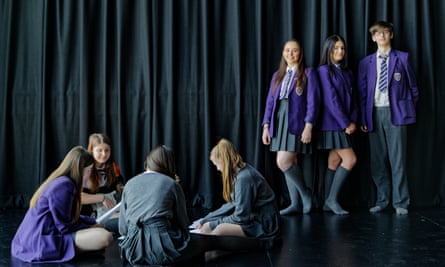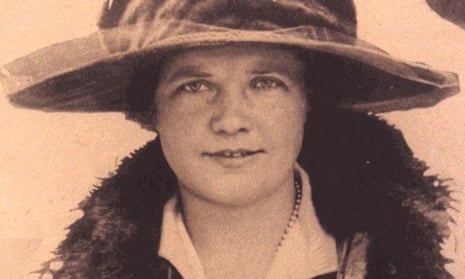The largely forgotten story of a Welsh suffragette who was jailed for blowing up a post box, survived a shipwreck, and played a key role in the fight to allow women into the House of Lords is being celebrated in a series of music events and talks.
Despite a life full of adventure, as well as political activism, Margaret Haig Thomas – Lady Rhondda – is not even a well-known figure in her native south Wales. A blue plaque on the red-brick house by the post box in Newport that she targeted is one of the few nods to her.
But this summer her story will be brought to life by Welsh National Opera in a music hall-style piece called Rhondda Rips It Up! that will open in Newport next month before touring the UK.
WNO will also host a symposium in Newport on the challenges faced by women in the classical music world and is leading community events including helping local schoolchildren create and perform their own 25-minute piece of musical theatre focusing on protest, rebellion and human rights.

Lisa Davies, a producer for the WNO working on the community outreach aspect of the project, admitted she had not heard of Lady Rhondda before becoming involved. “But the more I read her, the more she blows my mind. She should be an icon for so many. When WNO started thinking about Lady Rhondda it was relevant because of the 100th anniversary [of some women getting the vote.] I think she is becoming more relevant with the #MeToo movement.”
Lady Rhondda has also just made it on to a shortlist of women being considered for a statue in Cardiff. There are currently no female statues. “I’d vote for her,” said Davies.
Born in 1883, Lady Rhondda was the daughter of a Liberal politician with coal, shipping and publishing interests. She became secretary of the Newport branch of Emmeline Pankhurst’s Women’s Social and Political Union, attended demonstrations across the country and founded the feminist weekly magazine, Time and Tide.
In 1915 she was returning from the US onboard the ocean liner Lusitania when it was hit by a German torpedo and sunk. She clung on to a wooden board and survived.
After her father’s death she inherited his title but was not allowed to sit in the Lords. Lady Rhondda fought against the ban and the first women were allowed into the Lords in 1958, the year of her death.

Her most striking act, however, was blowing up the post box on Risca Road in Newport in June 1913 with a home-made device. She was tried at the session house in Usk and jailed after refusing to pay the fine. She went on hunger strike while in prison and was eventually released.
As part of this summer’s Lady Rhondda project, WNO and the group OperaSonic have gone into John Frost School in Newport to help students create their own piece of musical theatre using the suffragette slogan: “Deeds not words” as their starting point and inspiration.
The students know all about the 19th-century Chartist leader their school is named after, and his fight for workers’ rights, but few had heard of Lady Rhondda before the WNO’s project.
Now they are busy creating a show looking at themes ranging from mental health issues to feminism and the legalisation of cannabis, taking in musical styles including rap, punk and Disney.
The youngsters said they felt emboldened by the Lady Rhondda story. Fifteen-year-old Tamzin said: “This has made us think for ourselves. We have a lot to say and adults shouldn’t talk for us.” Another pupil, James, is part of a punk group within the show called Death To The West focusing on “misconceptions about men” and the scourge of depression. He plans to keep on writing political songs. “I’ll record and upload us somewhere,” he said.
In the WNO production, the soprano Lesley Garrett will guide the audience through the story of Lady Rhondda as master of ceremonies in a character based on real-life pioneering music hall entertainer Vesta Tilley, a female compère impersonating a male.
Garrett said: “This is a great celebration of a wonderful woman. She was a pioneer; Wales’s equivalent of Emmeline Pankhurst. All women in Britain should be grateful to her. It is an honour to be a part of a work that celebrates powerful women and their inspired quest for emancipation, liberation and respect.”
